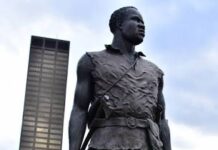When a 6-foot-tall African slave landed in Japan, he stuck out like a sore thumb. People lost all modesty and nearly caused a stampede trying to get a closer look. Such a sight was so foreign in Kyoto — he was one of the first Africans to ever arrive on the island — that a powerful Japanese warlord ordered him to remove his clothes while a flock of servants tried to scrub the “black ink” off his skin. Little did the warlord know that the slave was destined to become the world’s first Black samurai.
The samurai are among the most enduring symbols of Japanese cultural heritage, and few foreigners have ever claimed the title. But one unorthodox man stands out from the long lineup of noble Japanese warriors. The story of Yasuke may sound like the plot to a Quentin Tarantino movie, but he did indeed don a kabuto as history’s only African samurai. Yasuke was abducted from his home somewhere in central or western Africa — or Mozambique, historians say — and sold to a Jesuit priest named Alessandro Valignano.
In 1579, Father Valignano went on a missionary trip to Japan and took Yasuke with him. According to letters of Portuguese missionary Luis Frois and The History of the Church of Japan, a 17th-century book by François Solier, Yasuke was around 24 or 25 years old, towered over the Japanese at 6-foot-2 and had skin like an “ox” or “charcoal.”
“[YASUKE] WASN’T REGARDED AS HUMAN CHATTEL ANYMORE, BUT LIKE ALL VASSALS, EXPECTED TO SERVE ODA FAITHFULLY” – MATT ALT, VICE PRESIDENT, ALTJAPAN
His celebrity status soon piqued the curiosity of Oda Nobunaga, a medieval Japanese warlord who was striving to unify Japan and bring peace to a country racked by civil war. Nobunaga praised Yasuke’s strength and stature, describing “his might as that of 10 men,” and brought him on as his feudal bodyguard. The African’s original name is unknown, but Nobunaga called him Yasuke, most likely a Japanization of his birth name or Christian name. A worldly and open-minded ruler, “Nobunaga was very meritocratic. He could see past the skin. He used the Portuguese and foreigners during that time to his advantage,” says Lawrence Winkler, author of Samurai Road.
In the Land of the Rising Sun, Yasuke “wasn’t regarded as human chattel anymore, but like all vassals, expected to serve Oda faithfully,” says Tokyo-based Matt Alt, vice president of publishing house AltJapan.
Nobunaga grew fond of Yasuke and treated him like family as he earned his worth on the battlefield and on patrol at Azuchi Castle. In less than a year, Yasuke went from being a lowly page to joining the upper echelons of Japan’s warrior class, the samurai. Before long, Yasuke was speaking Japanese fluently and riding alongside Nobunaga in battle — “an honor reserved only for people Oda must have respected and trusted,” adds Alt. As one of Nobunaga’s right-hand men, Yasuke gained a handful of enviable privileges during his tenure — including his own private residence, a ceremonial katana sword and the pleasure of dining with Nobunaga — which few samurai were privy to at the time.
But much about Yasuke remains cloaked in mystery to this day. Like many uprooted slaves, the details of his early life are scant, and official records were poorly kept in 16th-century Japan. Not too surprising, since the era of Warring States, or the Sengoku period, was a turbulent century in history that resulted in a bloodbath as big personalities vied for control of Japan. Just as the Alamo or Antietam conjures images of brave generals and founding fathers, so too do the key struggles of the Sengoku era for modern Japan, says Alt. And during this period of cultural flowering and political upheaval, Yasuke became a footnote to the competing forces. “There’s really not a huge amount to say about Yasuke, great as he is,” adds Alt, noting how thin the historical records are. In the summer of 1582, not long after Yasuke achieved samurai status, a general betrayed Nobunaga, besieged his castle and burned everything to the ground. Ever the loyal warrior, Yasuke quickly joined Nobunaga’s son, Oda Nobutada, to help defend the fortress — but to no avail. The fortress was eventually overrun, and the enemy forces banished Yasuke to a European Jesuit missionary in Kyoto, where he lived out the remainder of his days in obscurity.
Although his samurai career was short-lived, Yasuke became the hero of Kuro-suke (くろ助), a children’s historical fiction book that won the Japanese Association of Writers for Children Prize in 1969. The book ends with Yasuke living to fight another day. But when he sleeps at night, he dreams of his parents in Africa and silently cries — the story of a valiant warrior triumphing against all odds, but also the story of a pained young man dropped into a world of strangers. His sacrifice, not his sword or slaughter, made him a true samurai.
Follow the Neptune Prime channel on WhatsApp:
Do you have breaking news, interview request, opinion, suggestion, or want your event covered? Email us at neptuneprime2233@gmail.com





